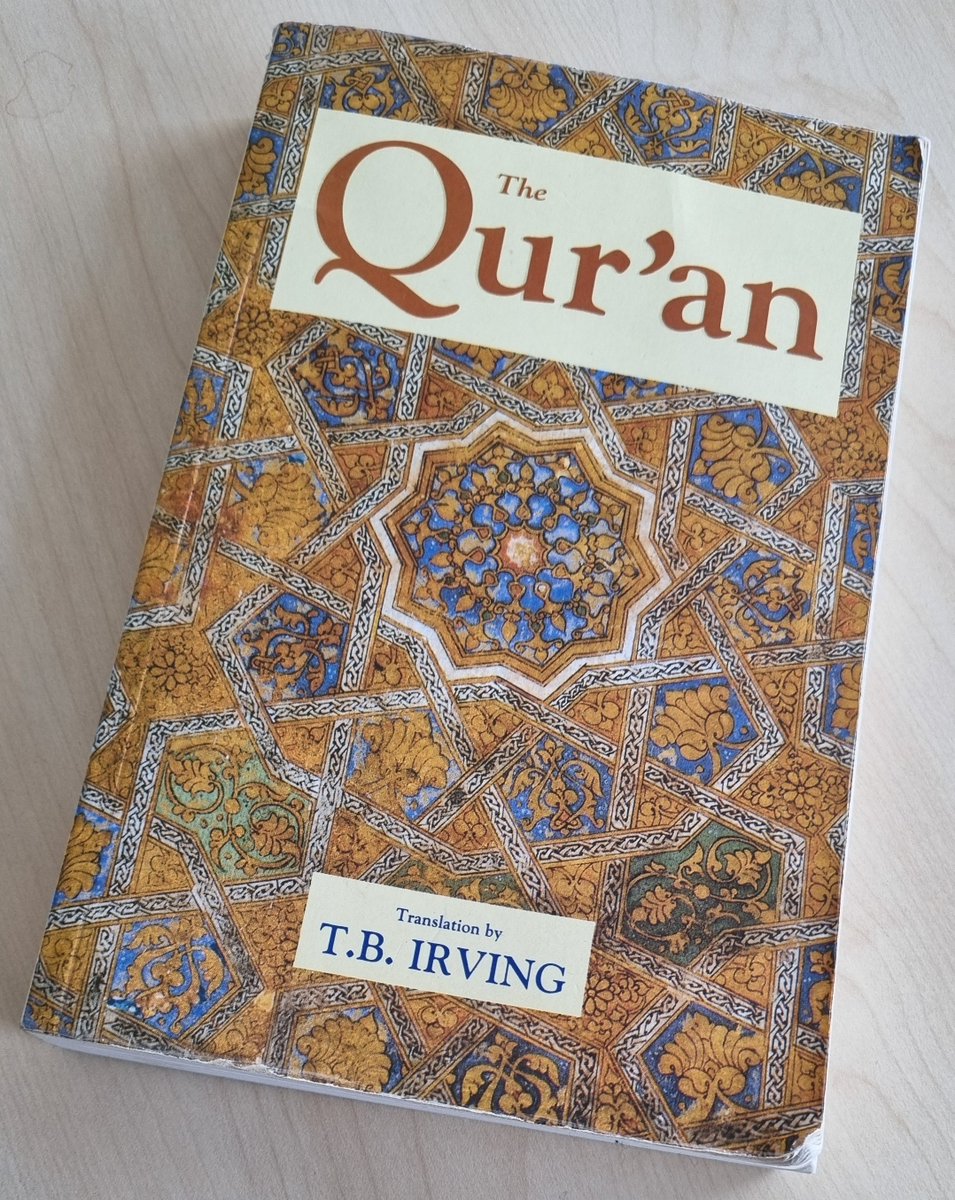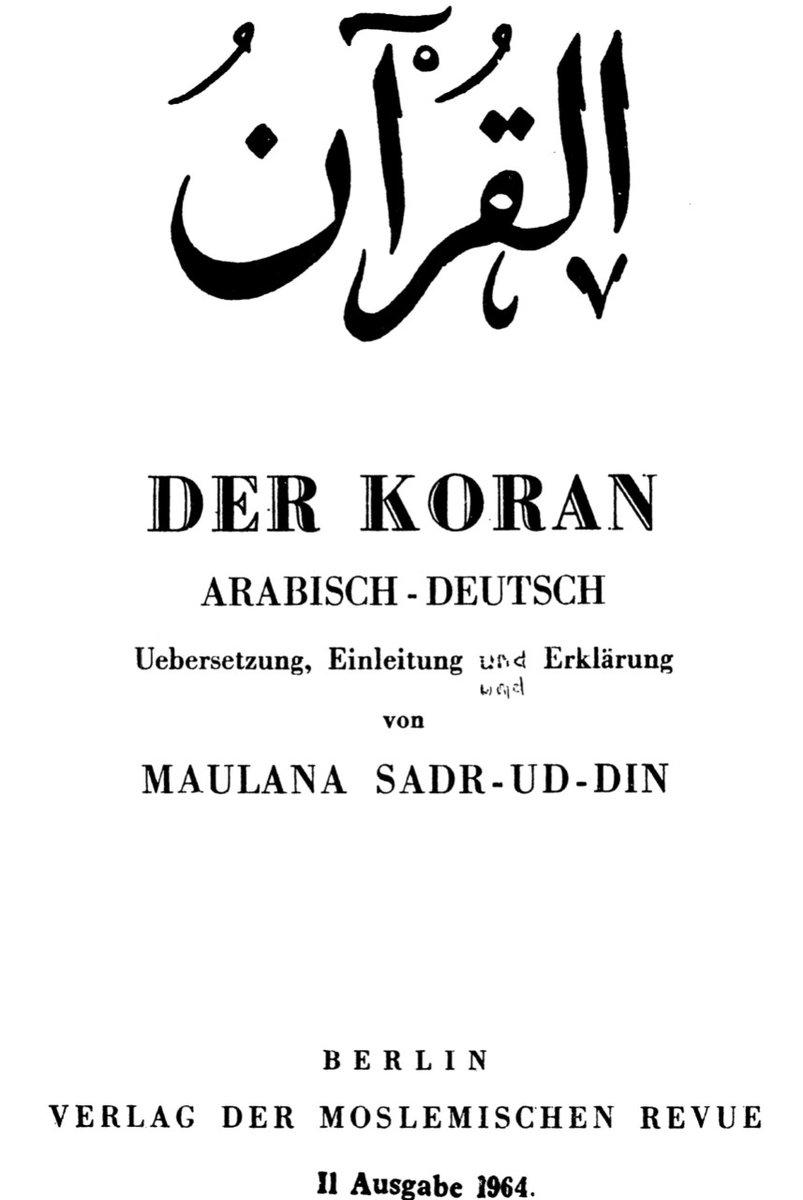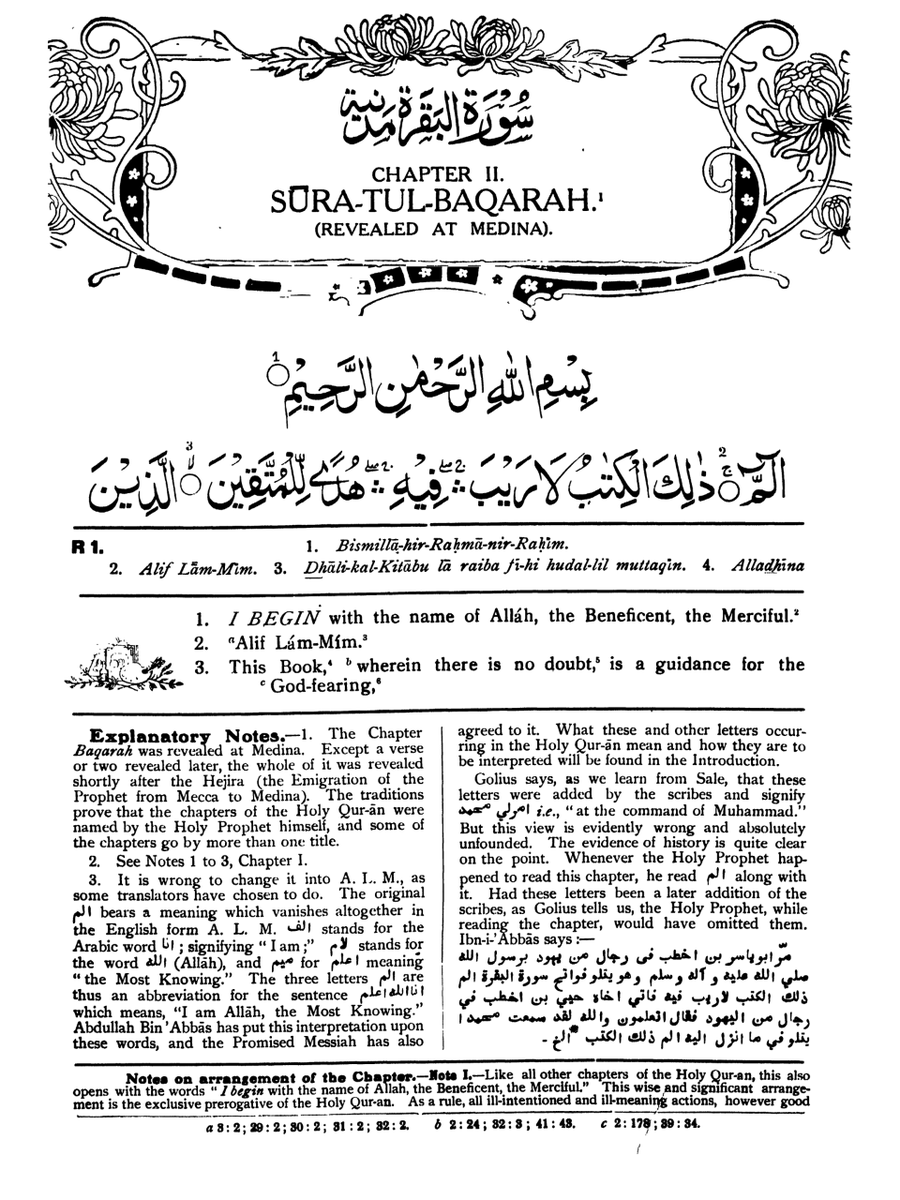
ERC-funded research project on the modern history of Qur'an translation. Ended April 30, 2025. PI: Johanna Pink. https://t.co/GdoecVcdbV
How to get URL link on X (Twitter) App


 Instead, when one browses websites or Islamic bookshops for English Qur’an translations today, the number of recent translations that claim to be ‘clear’, ‘easy’, ‘simple’, ‘plain’, or all of those things at once, is striking.
Instead, when one browses websites or Islamic bookshops for English Qur’an translations today, the number of recent translations that claim to be ‘clear’, ‘easy’, ‘simple’, ‘plain’, or all of those things at once, is striking. 


 Printed with funding from global donors, including a major halal food business that Levantine Muslim migrants had founded in the American Midwest, its publication was part of a globalizing trend.
Printed with funding from global donors, including a major halal food business that Levantine Muslim migrants had founded in the American Midwest, its publication was part of a globalizing trend.

 Right next to the entrance of the Ibn Tulun Mosque, one of the major Islamic tourist sites of Cairo, stood a big shelf that offered ‘free Islamic books’ in a variety of languages.
Right next to the entrance of the Ibn Tulun Mosque, one of the major Islamic tourist sites of Cairo, stood a big shelf that offered ‘free Islamic books’ in a variety of languages. 


 Like the versions in other languages (for English and Russian, see gloqur.de/quran-translat… and gloqur.de/quran-translat…), this German Qur’an translation was based on the concise Qur’an commentary
Like the versions in other languages (for English and Russian, see gloqur.de/quran-translat… and gloqur.de/quran-translat…), this German Qur’an translation was based on the concise Qur’an commentary 


 Sadr-ud-Din, who had previously worked as a missionary in Woking, arrived in Berlin in 1923 to promote the spread of Islam there. In 1925, he acquired a plot of land for a mosque, following which the Wilmersdorfer Moschee, the oldest mosque still standing in Germany, was built.
Sadr-ud-Din, who had previously worked as a missionary in Woking, arrived in Berlin in 1923 to promote the spread of Islam there. In 1925, he acquired a plot of land for a mosque, following which the Wilmersdorfer Moschee, the oldest mosque still standing in Germany, was built. 

 'Koran: Perevod na russkiĭ i͡azyk' by Ural Sharipov and Raisa Sharipova is associated with the Russian Academy of Sciences Institute of Oriental Studies (Iv Ran) and is intended to be useful for both an academic readership and the general public.
'Koran: Perevod na russkiĭ i͡azyk' by Ural Sharipov and Raisa Sharipova is associated with the Russian Academy of Sciences Institute of Oriental Studies (Iv Ran) and is intended to be useful for both an academic readership and the general public.


 The Ahmadiyya Movement was the first Islamic group to begin translating the Qur’an into European languages, a project they initiated at the beginning of the twentieth century. Since then, the Ahmadiyya has published more than 80 translations in different languages.
The Ahmadiyya Movement was the first Islamic group to begin translating the Qur’an into European languages, a project they initiated at the beginning of the twentieth century. Since then, the Ahmadiyya has published more than 80 translations in different languages.

 The works of Szynkiewicz, a Muslim and Orientalist scholar who served as mufti of Poland, are a good example of a contribution to the translation movement made by an outstanding personality.
The works of Szynkiewicz, a Muslim and Orientalist scholar who served as mufti of Poland, are a good example of a contribution to the translation movement made by an outstanding personality. 

 After the 1st modern ‘institutional’ TDRA translation into Turkish was published in 2001 (‘Kur’an-i Kerim Meali’ by Halil Altuntaş & Muzaffer Şahin), another project was successfully realized: ‘Kur'an Yolu Türkçe Meal ve Tefsir’ (‘The Path of the Qur’an: Translation and tafsīr’).
After the 1st modern ‘institutional’ TDRA translation into Turkish was published in 2001 (‘Kur’an-i Kerim Meali’ by Halil Altuntaş & Muzaffer Şahin), another project was successfully realized: ‘Kur'an Yolu Türkçe Meal ve Tefsir’ (‘The Path of the Qur’an: Translation and tafsīr’).

 This publication not only received official approval from Egypt’s al-Azhar University (which has a widespread policy of providing official sanction for translations it endorses), but was directly published through the Egyptian Ministry of Awqāf (‘endowments’).
This publication not only received official approval from Egypt’s al-Azhar University (which has a widespread policy of providing official sanction for translations it endorses), but was directly published through the Egyptian Ministry of Awqāf (‘endowments’).

 Published in numerous editions, it gained much of its fame in the late 1990s and early 2000s, while recently it has been criticized on various grounds, some more controversial than others.
Published in numerous editions, it gained much of its fame in the late 1990s and early 2000s, while recently it has been criticized on various grounds, some more controversial than others.


 Khan (1925–2021), an Indian scholar, was the founder of a Goodword Books, which focuses on the distribution of Qur’an translations.
Khan (1925–2021), an Indian scholar, was the founder of a Goodword Books, which focuses on the distribution of Qur’an translations. 


 In the period between the two world wars, Nejmi Sagib (or in later Turkish Spelling Necmi Sagıp) started translating the Qur’an into English verse in order to gain British support for Muslim Cypriot interests.
In the period between the two world wars, Nejmi Sagib (or in later Turkish Spelling Necmi Sagıp) started translating the Qur’an into English verse in order to gain British support for Muslim Cypriot interests. 

https://twitter.com/GloQur/status/1496217834791264256
 The Ottoman Empire had entered the war in November 1914 on the side of Germany and Austria-Hungary. Pro-Ottoman circles in Germany were eager to sell this new alliance to a German-speaking public.
The Ottoman Empire had entered the war in November 1914 on the side of Germany and Austria-Hungary. Pro-Ottoman circles in Germany were eager to sell this new alliance to a German-speaking public.

 It is commonly stated that Abdullah Yusuf Ali’s “The Holy Qur’an” has been printed more than any other in English, and is most sought after. One site provides an indicative graph that may support this claim:
It is commonly stated that Abdullah Yusuf Ali’s “The Holy Qur’an” has been printed more than any other in English, and is most sought after. One site provides an indicative graph that may support this claim:


 The general answer across the Abrahamic faiths has been ‘no’, however the tendency to eschew the intermediation of religious scholars and clergy and focus solely on scripture has been represented by various religious movements throughout history.
The general answer across the Abrahamic faiths has been ‘no’, however the tendency to eschew the intermediation of religious scholars and clergy and focus solely on scripture has been represented by various religious movements throughout history.

 ‘Die Heilige Qur’ān’ by Imam Mohammed Armien Baker (1910–1982) was first published in 1961 in Cape Town. Baker was the imam of the Noorul Islam Mosque in Simon’s Town (Afrikaans: Simonstad), a naval settlement near Cape Town, and also principal of the Muslim primary school.
‘Die Heilige Qur’ān’ by Imam Mohammed Armien Baker (1910–1982) was first published in 1961 in Cape Town. Baker was the imam of the Noorul Islam Mosque in Simon’s Town (Afrikaans: Simonstad), a naval settlement near Cape Town, and also principal of the Muslim primary school. 


 Sayyid Ahmad Khan was born in Delhi in 1817 into an Ashraf family. After the death of his father, he decided to work for the British, becoming part of the colonial legal administration.
Sayyid Ahmad Khan was born in Delhi in 1817 into an Ashraf family. After the death of his father, he decided to work for the British, becoming part of the colonial legal administration.

 The history of Qur’an interpretation in Eastern Turkic areas has its roots in the medieval era while Qur’an translations, in the modern sense of independent books containing the translated text of the Qur’an, have appeared only recently.
The history of Qur’an interpretation in Eastern Turkic areas has its roots in the medieval era while Qur’an translations, in the modern sense of independent books containing the translated text of the Qur’an, have appeared only recently.

 The Ahmadiyya Movement has been translating the Qur’an into different languages for more than 100 years, with the goal of making the meaning of the Qur’an accessible in all languages of the world.
The Ahmadiyya Movement has been translating the Qur’an into different languages for more than 100 years, with the goal of making the meaning of the Qur’an accessible in all languages of the world.